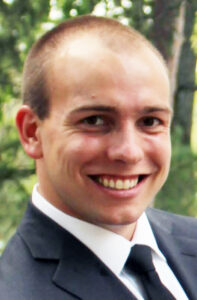By Patrick Schmadeke
Discernment might be akin to a revolving door — the process should never really stop if we are trying to grow in holiness. If we try to go about the business of discernment too quickly, we might just end up disoriented.
In last Sunday’s Gospel we heard Jesus give a concise image for how we can consider the relationship between the quality of our external activities and our interior life of discernment. Jesus said “a good tree does not bear rotten fruit, nor does a rotten tree bear good fruit. For every tree is known by its own fruit. For people do not pick figs from thornbushes, nor do they gather grapes from brambles.”(Lk 6:43-44)

Taking the image one step further, a holy life of discernment involves at least three considerations. First, what is the task we are being called to address in any particular moment? Second, what are the skills and abilities that enable us to address the situation? Third, are we self-aware enough to consider whether we have cultivated the spiritual disposition necessary for the occasion?
The first and second considerations are rather straight forward. Thornbushes are not good for producing figs, nor am I good for tutoring calculus or economics. On the other hand, we all have particular strengths which lend themselves to building up the kingdom of God in ways big and small. Such self-awareness and sureness in our strengths creates space for God to use us in ways we previously may not have considered possible.
The third consideration from Jesus’ analogy requires greater attentiveness and is perhaps the most important part of our discernment. It may be easy to know our strengths, but discerning when and how to apply them requires greater pastoral sensitivity and self-care.
The pace at which the world operates is not conducive to rich discernment. How do we remain clear-headed so that we can contribute through our vocations and daily interactions to the building of God’s kingdom? How do we keep the noise of distraction at bay so that we can hear the whisper of God’s still small voice in our lives?
When we tap into a prayerful space where we encounter God, the Lord stills the waters of our soul, fills our hearts with warmth and focuses our vision to send us out on a mission yet again.
Cultivating such silent spaces, and returning to them often, amplifies the whisper of God’s voice so it is not so small anymore. When we are rooted in the assurance of discernment we arrive at the ministerial philosophy theologian Henri Nouwen described: we can be “flexible without being relativistic, convinced without being rigid, willing to confront without being offensive, gentle and forgiving without being soft, and true witnesses without being manipulative.”
Arriving at these skills is no easy task. But this kind of spiritual grounding is witnessed by the saints, whose prayer and discernment produced richly diverse fruits. St. Augustine and his mother St. Monica, together in the days before her death, were flooded with a delicate and all-consuming hush that came over the intimacy of their encounter. It must have been the same sweet prayerful silence where St. Ambrose of Milan found the loving and discriminating resolve to privately implore an emperor to penance. St. Francis of Assisi, too, was in prayer when he heard God say again and again the words that have begun echoing poignantly with us in recent months, “rebuild my Church.”
We are continually asked by God and our communities to train our minds and hearts on the love that God wants to express in and through us, so that we, too, might contribute to building up the kingdom. We most effectively live up to the call of authentic discernment when we listen attentively to the Lord. In the end, we all bring various gifts to the table and all of them are necessary for the task God has given us. So whether you’re a fig tree or a grapevine, be a good one.
(Editor’s note: Patrick Schmadeke is a graduate of St. Ambrose University (‘13) and a student in the Master of Divinity program at the University of Notre Dame. His column offers reflections on his coursework, engaging with the richness of the Catholic Tradition and its relevance to the world today.)











